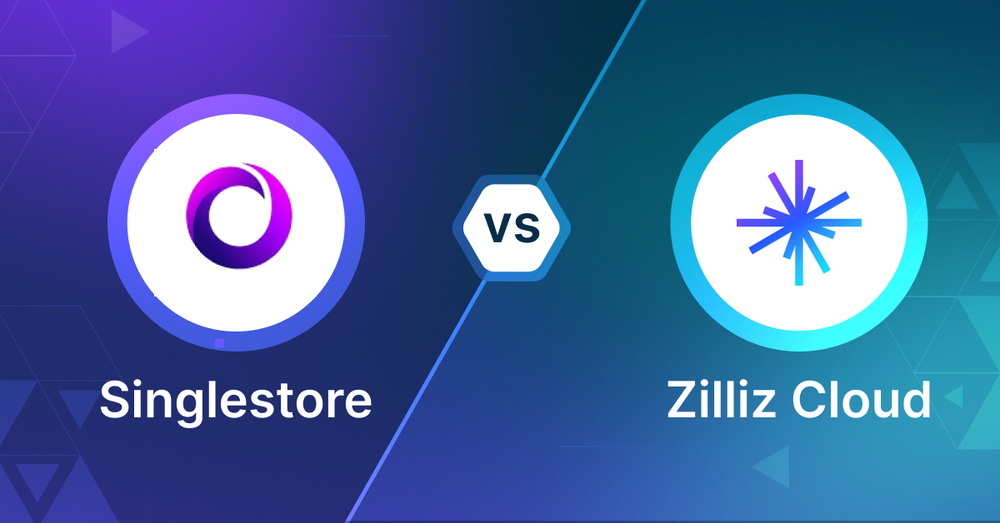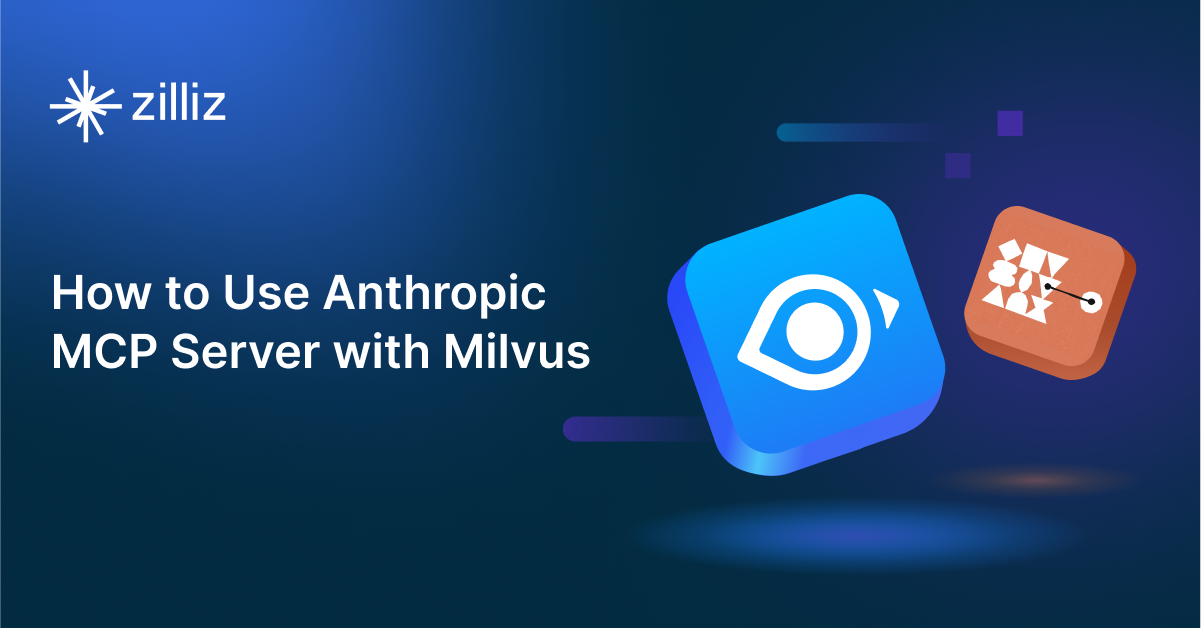SingleStore vs Zilliz Cloud Choosing the Right Vector Database for Your AI Apps

What is a Vector Database?
Before we compare SingleStore and Zilliz Cloud, let's first explore the concept of vector databases.
A vector database is specifically designed to store and query high-dimensional vectors, which are numerical representations of unstructured data. These vectors encode complex information, such as the semantic meaning of text, the visual features of images, or product attributes. By enabling efficient similarity searches, vector databases play a pivotal role in AI applications, allowing for more advanced data analysis and retrieval.
Common use cases for vector databases include e-commerce product recommendations, content discovery platforms, anomaly detection in cybersecurity, medical image analysis, and natural language processing (NLP) tasks. They also play a crucial role in Retrieval Augmented Generation (RAG), a technique that enhances the performance of large language models (LLMs) by providing external knowledge to reduce issues like AI hallucinations.
There are many types of vector databases available in the market, including:
- Purpose-built vector databases such as Milvus, Zilliz Cloud (fully managed Milvus)
- Vector search libraries such as Faiss and Annoy.
- Lightweight vector databases such as Chroma and Milvus Lite.
- Traditional databases with vector search add-ons capable of performing small-scale vector searches.
SingleStore is a distributed, relational, SQL database management system with vector search as an add-on and Zilliz Cloud is a purpose-built vector database. This post compares their vector search capabilities.
SingleStore: Overview and Core Technology
SingleStore has made vector search possible by putting it in the database itself, so you don’t need separate vector databases in your tech stack. Vectors can be stored in regular database tables and searched with standard SQL queries. For example, you can search similar product images while filtering by price range or explore document embeddings while limiting results to specific departments. The system supports both semantic search using FLAT, IVF_FLAT, IVF_PQ, IVF_PQFS, HNSW_FLAT, and HNSW_PQ for vector index and dot product and Euclidean distance for similarity matching. This is super useful for applications like recommendation systems, image recognition and AI chatbots where similarity matching is fast.
At its core SingleStore is built for performance and scale. The database distributes the data across multiple nodes so you can handle large scale vector data operations. As your data grows you can just add more nodes and you’re good to go. The query processor can combine vector search with SQL operations so you don’t need to make multiple separate queries. Unlike vector only databases SingleStore gives you these capabilities as part of a full database so you can build AI features without managing multiple systems or dealing with complex data transfers.
For vector indexing SingleStore has two options. The first is exact k-nearest neighbors (kNN) search which finds the exact set of k nearest neighbors for a query vector. But for very large datasets or high concurrency SingleStore also supports Approximate Nearest Neighbor (ANN) search using vector indexing. ANN search can find k near neighbors much faster than exact kNN search sometimes by orders of magnitude. There’s a trade off between speed and accuracy - ANN is faster but may not return the exact set of k nearest neighbors. For applications with billions of vectors that need interactive response times and don’t need absolute precision ANN search is the way to go.
The technical implementation of vector indices in SingleStore has specific requirements. These indices can only be created on columnstore tables and must be created on a single column that stores the vector data. The system currently supports Vector Type(dimensions[, F32]) format, F32 is the only supported element type. This structured approach makes SingleStore great for applications like semantic search using vectors from large language models, retrieval-augmented generation (RAG) for focused text generation and image matching based on vector embeddings. By combining these with traditional database features SingleStore allows developers to build complex AI applications using SQL syntax while maintaining performance and scale.
Zilliz Cloud: Overview and Core Technology
Zilliz Cloud is a fully managed vector database service built on top of the open-source Milvus engine. It helps developers and organizations to handle large scale AI applications by storing, managing and searching vector embeddings efficiently. It takes care of infrastructure for you, so you can focus on building AI features instead of managing databases.
One of the key advantages of Zilliz Cloud is the automatic performance optimization. The system has AutoIndex technology which will choose the best indexing method for your data and use case. So you don’t have to spend time tuning parameters or comparing different index types. The platform also uses IVF (Inverted File) and graph-based techniques to speed up similarity search across large datasets.
The platform has enterprise features. You can deploy your vector databases across AWS, Azure or Google Cloud, with options to use Zilliz’s fully managed service or bring your own cloud account (BYOC). For organizations that handle sensitive data, Zilliz Cloud has security controls like encryption, access management and compliance tools. The system also supports different consistency levels so you can balance between fast updates and strong data consistency based on your needs.
Cost management is another important aspect of Zilliz Cloud. The platform uses tiered storage to automatically move less accessed data to cheaper storage options, so you can reduce cost without affecting performance. You can also choose compute resources that match your workload - for example, use more powerful instances for heavy processing tasks and lighter ones for simple queries. This flexibility helps you to optimize your spending while maintaining good performance.
For AI applications that need to search different types of data together, Zilliz Cloud supports hybrid search. You can search across text embeddings, image vectors and other data types in a single query. The platform also supports various similarity metrics like Cosine, Euclidean and Inner Product so it’s suitable for different machine learning models and use cases. As your data grows, the system can scale horizontally by adding more resources automatically so you can maintain good performance even under heavy workload.
Key Differences
Search Methodology
SingleStore has vector search built into its SQL database, supports multiple search algorithms: FLAT, IVF_FLAT, IVF_PQ, IVF_PQFS, HNSW_FLAT, HNSW_PQ. It offers both exact k-nearest neighbors (kNN) and Approximate Nearest Neighbor (ANN) search. The choice between these depends on your accuracy requirements - exact kNN is perfect but slower, ANN is faster but less accurate.
Zilliz Cloud, built on Milvus, uses AutoIndex to automatically choose the best indexing strategy for your data. It uses IVF and graph-based for similarity search, takes the index selection out of your hands.
Data
SingleStore is unique in combining vector search with traditional SQL. This means you can do vector similarity search while applying SQL filters. For example, finding similar products within specific price ranges. Vectors must be stored in columnstore tables and currently only supports Vector Type(dimensions[, F32]) format.
Zilliz Cloud has more flexibility in data types, supports hybrid search across text embeddings, image vectors and other data types in one query. It supports multiple similarity metrics: Cosine, Euclidean, Inner Product, compatible with different machine learning models.
Scalability and Performance
SingleStore has a distributed architecture where data is sharded across multiple nodes. As your data grows, you can add more nodes to keep performance. The system combines vector search with SQL in one query, reduces overhead.
Zilliz Cloud handles scalability through auto horizontal scaling, adding resources as needed. It uses tiered storage to optimize costs by moving less accessed data to cheaper storage while maintaining performance.
Integration and Management
SingleStore has vector search built into its database system. There is no need for separate vector databases. Simplifies the tech stack and reduces data transfer complexity.
Zilliz Cloud is available on AWS, Azure, Google Cloud, with both managed service and bring-your-own-cloud (BYOC) options. This gives you flexibility in cloud provider and management approach.
Security and Enterprise Features
SingleStore has standard database security features.
Zilliz Cloud has full security controls: encryption, access management, compliance tools. It also has different consistency levels to balance between update speed and data consistency.
Cost
SingleStore's cost is based on overall database usage, vector search is part of the main system.
Zilliz Cloud has cost optimization through tiered storage and flexible compute resource selection. You can choose different instance types based on your workload, can be more cost effective.
When to Choose Each Technology
SingleStore is the optimal choice for organizations that want to combine traditional SQL operations with vector search in a unified system. It excels in scenarios where you need to perform complex queries that mix vector similarity search with structured data filtering, such as e-commerce platforms that match similar products while filtering by price or category, recommendation engines that need to consider both user preferences and business rules, or content management systems that require precise control over search results through SQL operations.
Zilliz Cloud shines in pure AI-driven applications that require flexible vector search capabilities without extensive SQL integration. It's particularly well-suited for applications like image similarity search, semantic document retrieval, or AI chatbots where automatic index optimization and hybrid search capabilities across different data types are crucial. The platform's managed service approach, with its automatic scaling and tiered storage, makes it ideal for teams that want to focus on building AI features without managing infrastructure details.
Conclusion
The choice between SingleStore and Zilliz Cloud fundamentally comes down to your application's architecture and requirements. SingleStore's strength lies in its SQL integration and ability to combine vector search with traditional database operations, making it a powerful choice for applications that need both capabilities. Zilliz Cloud, on the other hand, offers superior automation, flexible deployment options, and specialized vector search features, making it ideal for pure AI applications. Your decision should be guided by factors like your existing technology stack, the importance of SQL integration, need for automated management, and specific performance requirements for your use case.
Read this to get an overview of SingleStore and Zilliz Cloud but to evaluate these you need to evaluate based on your use case. One tool that can help with that is VectorDBBench, an open-source benchmarking tool for vector database comparison. In the end, thorough benchmarking with your own datasets and query patterns will be key to making a decision between these two powerful but different approaches to vector search in distributed database systems.
Using Open-source VectorDBBench to Evaluate and Compare Vector Databases on Your Own
VectorDBBench is an open-source benchmarking tool for users who need high-performance data storage and retrieval systems, especially vector databases. This tool allows users to test and compare different vector database systems like Milvus and Zilliz Cloud (the managed Milvus) using their own datasets and find the one that fits their use cases. With VectorDBBench, users can make decisions based on actual vector database performance rather than marketing claims or hearsay.
VectorDBBench is written in Python and licensed under the MIT open-source license, meaning anyone can freely use, modify, and distribute it. The tool is actively maintained by a community of developers committed to improving its features and performance.
Download VectorDBBench from its GitHub repository to reproduce our benchmark results or obtain performance results on your own datasets.
Take a quick look at the performance of mainstream vector databases on the VectorDBBench Leaderboard.
Read the following blogs to learn more about vector database evaluation.
Further Resources about VectorDB, GenAI, and ML
- What is a Vector Database?
- SingleStore: Overview and Core Technology
- Zilliz Cloud: Overview and Core Technology
- Key Differences
- **When to Choose Each Technology**
- **Conclusion**
- Using Open-source VectorDBBench to Evaluate and Compare Vector Databases on Your Own
- Further Resources about VectorDB, GenAI, and ML
Content
Start Free, Scale Easily
Try the fully-managed vector database built for your GenAI applications.
Try Zilliz Cloud for FreeKeep Reading

How to Use Anthropic MCP Server with Milvus
Discover how Model Context Protocol (MCP) pairs with Milvus to eliminate AI integration hassles, enabling smarter agents with seamless data access and flexibility.

Milvus WebUI: A Visual Management Tool for Your Vector Database
Milvus WebUI is a built-in GUI introduced in Milvus v2.5 for system observability. WebUI comes pre-installed with your Milvus instance and offers immediate access to critical system metrics and management features.

AI Integration in Video Surveillance Tools: Transforming the Industry with Vector Databases
Discover how AI and vector databases are revolutionizing video surveillance with real-time analysis, faster threat detection, and intelligent search capabilities for enhanced security.
The Definitive Guide to Choosing a Vector Database
Overwhelmed by all the options? Learn key features to look for & how to evaluate with your own data. Choose with confidence.